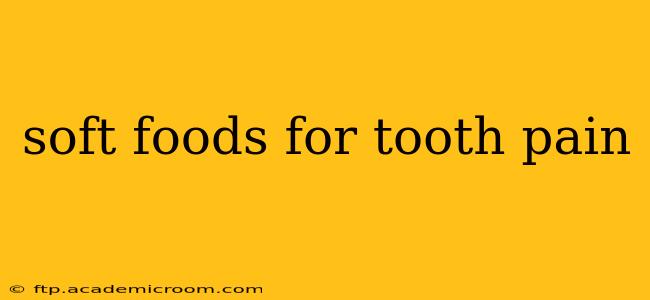Dealing with tooth pain can be incredibly uncomfortable, making even simple acts like eating a challenge. The right foods can significantly ease discomfort while still providing the necessary nutrients. This guide explores soft foods ideal for managing tooth pain, focusing on textures, nutritional value, and practical tips.
What Causes Tooth Pain Requiring a Soft Food Diet?
Before diving into specific food recommendations, it's crucial to understand why you might need a soft food diet. Several dental issues can cause tooth pain, necessitating a temporary shift to softer textures. These include:
- Tooth decay: Cavities can cause sharp, throbbing pain.
- Gum disease: Inflamed gums can be extremely sensitive and painful.
- Abscesses: A bacterial infection in the tooth or gums can cause severe pain and swelling.
- Wisdom teeth: Impacted or erupting wisdom teeth can lead to discomfort and inflammation.
- Recent dental procedures: Extractions, fillings, or root canals often require a period of recovery with a soft food diet.
What are the Best Soft Foods for Tooth Pain?
Choosing the right soft foods requires consideration of both texture and nutritional content. Here are some excellent options:
Smoothies and Soups
Smoothies: These are packed with nutrients and are incredibly easy on sensitive teeth. Use soft fruits like bananas, berries, and mangoes, along with yogurt or milk for creaminess. You can also add leafy greens for extra vitamins.
Soups: Broths, pureed soups (like tomato or butternut squash), and cream-based soups offer a balanced meal without requiring much chewing. Avoid soups with hard vegetables or chunky ingredients.
Pureed Foods
Applesauce: A classic choice, applesauce is naturally sweet and provides fiber.
Mashed potatoes: These are easy to digest and provide essential carbohydrates. Avoid adding crunchy toppings.
Avocado: Rich in healthy fats and nutrients, avocados can be mashed or blended into smoothies.
Other Soft Food Options
Yogurt: A good source of protein and calcium, yogurt is gentle on sensitive teeth. Choose plain varieties to avoid added sugars.
Scrambled eggs: Eggs are a great source of protein, and when scrambled, they're soft enough for sensitive teeth.
Oatmeal: Oatmeal is easy to chew and provides fiber and complex carbohydrates for sustained energy. Choose plain oatmeal and add soft fruits or a drizzle of honey for sweetness.
Cottage cheese: A good source of protein and calcium, cottage cheese is soft and easy to eat.
What Foods Should You Avoid with Tooth Pain?
While choosing soft foods is key, it's equally important to avoid those that could aggravate your pain:
- Hard foods: Avoid anything crunchy, like chips, nuts, or hard candies.
- Sticky foods: Sticky foods like caramel or gum can get stuck in your teeth and exacerbate pain.
- Acidic foods: Acidic foods and drinks, like citrus fruits and sodas, can irritate sensitive teeth and gums.
- Extremely hot or cold foods: Temperature extremes can increase sensitivity.
How Long Should I Stick to a Soft Food Diet?
The duration of your soft food diet depends on the underlying cause of your tooth pain. A minor issue might only require a few days, while more significant problems could necessitate several weeks or even longer. Always follow your dentist's recommendations.
Can I Eat Solid Foods Again After Tooth Pain Subsides?
Once your pain subsides, you can gradually reintroduce solid foods into your diet. Start with softer textures and gradually increase the firmness. Pay attention to any discomfort, and if pain returns, revert back to softer options.
Frequently Asked Questions
What are some good soft food recipes for tooth pain?
Many recipes can be adapted for a soft food diet. Look for recipes that feature pureed ingredients or those that are naturally soft. For example, you could make a creamy tomato soup, mashed sweet potatoes with a touch of cinnamon, or a banana and yogurt smoothie. Numerous online resources offer soft food recipes specifically designed for post-dental surgery or tooth pain recovery.
Are there any nutritional deficiencies I should be aware of when eating a soft food diet?
A prolonged soft food diet can potentially lead to nutritional deficiencies if not carefully planned. Ensure your diet includes a variety of soft foods to cover all essential nutrients. If you're concerned about your nutrient intake, consult a registered dietitian or nutritionist.
What if my tooth pain persists despite eating soft foods?
If your tooth pain persists despite following a soft food diet, it is crucial to consult a dentist immediately. The pain might indicate a more serious underlying problem that requires professional attention. Ignoring persistent tooth pain can lead to more significant complications.
Remember, this information is for general guidance only and does not constitute medical advice. Always consult your dentist or doctor for personalized recommendations concerning your specific dental health needs.
